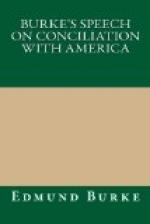The celebrated case of Wilkes offered an opportunity for discussing the narrow and corrupt policy pursued by George iii. and his followers. Wilkes, outlawed for libel and protected in the meantime through legal technicalities, was returned to Parliament by Middlesex. The House expelled him. He was repeatedly elected and as many times expelled, and finally the returns were altered, the House voting its approval by a large majority. In 1770 Burke published his pamphlet [Footnote: Present Discontents] in which he discussed the situation. For the first time he showed the full sweep and breadth of his understanding. His tract was in the interest of his party, but it was written in a spirit far removed from narrow partisanship. He pointed out with absolute clearness the cause of dissatisfaction and unrest among the people and charged George iii. and his councillors with gross indifference to the welfare of the nation and corresponding devotion to selfish interests. He contended that Parliament was usurping privileges when it presumed to expel any one, that the people had a right to send whomsoever they pleased to Parliament, and finally that “in all disputes between them and their rulers, the presumption was at least upon a par in favor of the people.” From this time until the American Revolution, Burke used every opportunity to denounce the policy which the king was pursuing at home and abroad. He doubtless knew beforehand that what he might say would pass unnoticed, but he never faltered in a steadfast adherence to his ideas of government, founded, as he believed, upon the soundest principles. Bristol elected him as its representative in Parliament. It was a great honor and Burke felt its significance, yet he did not flinch when the time came for him to take a stand. He voted for the removal of some of the restrictions upon Irish trade. His constituents, representing one of the most prosperous mercantile districts, angered and disappointed at what they held to be a betrayal of trust, refused to reelect him.
Lord North’s ministry came to an end in 1782, immediately after the battle of Yorktown, and Lord Rockingham was chosen prime minister. Burke’s past services warranted him in expecting an important place in the cabinet, but he was ignored. Various things have been suggested as reasons for this: he was poor; some of his relations and intimate associates were objectionable; there were dark hints of speculations; he was an Irishman. It is possible that any one of these facts, or all of them, furnished a good excuse for not giving him an important position in the new government. But it seems more probable that Burke’s abilities were not appreciated so justly as they have been since. The men with whom he associated saw some of his greatness but not all of it. He was assigned the office of Paymaster of Forces, a place of secondary importance.




